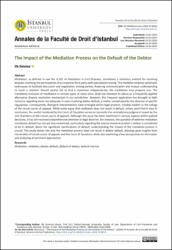| dc.contributor.author | Dırenisa, Efe | |
| dc.date.accessioned | 2024-04-29T08:12:09Z | |
| dc.date.available | 2024-04-29T08:12:09Z | |
| dc.date.issued | 2024 | en_US |
| dc.identifier.citation | Dırenisa, E. (2024). The impact of the mediation process on the default of the debtor. Annales de la Faculté de Droit d’Istanbul. Istanbul University Press, 1-16. | en_US |
| dc.identifier.uri | https://hdl.handle.net/20.500.12846/1193 | |
| dc.description.abstract | Mediation, as defined in Law No. 6,325 on Mediation in Civil Disputes, constitutes a voluntary method for resolving
disputes involving the participation of an impartial third party with specialized training. The mediator employs systematic
techniques to facilitate discussion and negotiation among parties, fostering communication and mutual understanding
to reach a solution. Should parties fail to find a resolution independently, the meditation may propose one. The
mandatory inclusion of meditation in certain types of cases since 2018 has elevated its status as a frequently applied
alternative dispute resolution mechanism in our jurisdiction. However, this frequent application has brought to light
concerns regarding areas not adequate in cases involving debtor default, a matter complicated by the absence of specific
regulations. Consequently, divergent interpretations have emerged within legal practice, notably evident in the rulings
of the circuit courts of appeals. While some argue that mediation does not result in default, others posit that it may. In
conclusion, the verdict rendered by the Court of Cassation serves to reconcile the contradictory judgment issued by the
civil chambers of the circuit courts of appeals. Although this issue has been examined in various aspects within judicial
decisions, it has not received comprehensive attention in legal doctrine. For instance, the question of whether mediation
constitutes default has not yet been examined, particularly regarding the precise moment at which a debtor is considered
to be in default. Given the significant ramifications of default, understanding the impact of the mediation process is
crucial. This study delves into why the mediation process does not result in debtor default, drawing upon insights from
the verdicts of circuit courts of appeals and the Court of Cassation, while also examining a few perspectives on the matter
and analyzing all pertinent approaches. | en_US |
| dc.language.iso | eng | en_US |
| dc.publisher | Istanbul University Press | en_US |
| dc.relation.isversionof | 10.26650/annales.2024.74.0014 | en_US |
| dc.rights | info:eu-repo/semantics/openAccess | en_US |
| dc.subject | Mediation | en_US |
| dc.subject | Mediator | en_US |
| dc.subject | Debtor | en_US |
| dc.subject | Default | en_US |
| dc.subject | Default of debtor | en_US |
| dc.subject | Default interest | en_US |
| dc.title | The impact of the mediation process on the default of the debtor | en_US |
| dc.type | article | en_US |
| dc.relation.journal | Annales de la Faculté de Droit d’Istanbul | en_US |
| dc.contributor.authorID | 0000-0002-2220-9468 | en_US |
| dc.relation.publicationcategory | Makale - Uluslararası Hakemli Dergi - Kurum Öğretim Elemanı | en_US |
| dc.contributor.department | TAÜ, Hukuk Fakültesi, Özel Hukuk Bölümü | en_US |
| dc.identifier.startpage | 1 | en_US |
| dc.identifier.endpage | 16 | en_US |

















